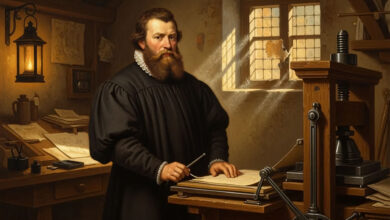Grace Brewster Murray Hopper was born on 9 December 1906 in New York City, United States. She became one of the most significant figures in the field of computer science, pioneering programming languages and playing a crucial role in shaping modern computing. Her work in developing compilers and advancing machine-independent programming languages revolutionised the way computers function, making her a key architect of the digital age.
From a young age, Hopper demonstrated an exceptional aptitude for mathematics and science. Encouraged by her parents to pursue education despite the societal norms of the early 20th century, she attended Vassar College, where she graduated in 1928 with a degree in mathematics and physics. She continued her education at Yale University, earning a master’s degree in 1930 and later a PhD in mathematics in 1934. At a time when few women pursued careers in STEM fields, Hopper’s achievements were groundbreaking.
She began her academic career as a professor of mathematics at Vassar College, where she taught for nearly a decade. However, with the outbreak of the Second World War, she felt compelled to contribute to the war effort. In 1943, she joined the United States Navy Reserve and was assigned to the Bureau of Ordnance Computation Project at Harvard University. It was here that she worked on the Mark I computer, one of the earliest electromechanical computers, laying the foundation for her lifelong involvement in computer programming.
Hopper quickly grasped the potential of computers in solving complex problems and became an essential part of their development. She played a key role in programming the Mark I and later worked on the Mark II and Mark III computers. During this time, she coined the term “debugging” after removing an actual moth from the Mark II computer, an anecdote that has become legendary in computing history.
After the war, she continued her work with computers, joining the Eckert-Mauchly Computer Corporation in 1949, where she was instrumental in the development of the UNIVAC I, the first commercially produced computer in the United States. Her most notable contribution was the development of the first compiler, a program that translates human-readable code into machine language. This breakthrough paved the way for modern programming languages, making it easier for people to interact with computers without requiring intricate knowledge of machine code.
Her work led to the creation of COBOL (Common Business-Oriented Language), one of the first high-level programming languages. COBOL was designed to be user-friendly and readable, allowing businesses and governments to standardise computing operations. Hopper’s vision of machine-independent programming was a major advancement, as it enabled software to be transferred across different systems without requiring complete rewrites.
Despite resistance from those who believed computers should only be programmed in machine language, Hopper persevered. She championed the idea that computing should be accessible to a broader audience, and her work laid the foundation for modern software engineering. Her influence extended beyond programming languages, as she also contributed to the standardisation of computer languages through her work with the Department of Defense and the National Bureau of Standards.
Throughout her career, Hopper was a vocal advocate for computer education and innovation. She travelled extensively, delivering lectures and presentations to promote the importance of programming and automation. She believed in the power of curiosity and encouraged young people to push boundaries in technological advancement. Her famous quote, “The most dangerous phrase in the language is, ‘We’ve always done it this way,’” encapsulated her approach to innovation and change.
She remained in the Navy for much of her career, retiring in 1966 but was recalled to active duty shortly after due to her unparalleled expertise. She continued working on Navy computing projects and modernisation efforts until her final retirement in 1986 at the age of 79. At the time of her retirement, she was the oldest active-duty commissioned officer in the United States Navy, holding the rank of Rear Admiral.
Even after leaving active service, Hopper continued to influence the tech world, working as a senior consultant for Digital Equipment Corporation. She remained an active mentor and advocate for women in computing, encouraging greater diversity in the field and inspiring countless individuals to pursue careers in technology.
Her contributions were widely recognised, and she received numerous awards and honours throughout her lifetime. She was the first woman to receive the National Medal of Technology in 1991, an honour bestowed upon her by President George H. W. Bush. She also received more than 40 honorary degrees from universities worldwide, reflecting her profound impact on education and computing.
On 1 January 1992, Grace Hopper passed away in Arlington, Virginia, at the age of 85. She was laid to rest with full military honours at Arlington National Cemetery, a testament to her service to both the military and the computing world. Her legacy endures in many ways, from the continued use of COBOL in business and government operations to the Grace Hopper Celebration, an annual conference dedicated to women in computing that continues to inspire new generations of programmers and technologists.
Hopper’s impact on modern computing is immeasurable. Her work on compilers and programming languages transformed the way humans interact with machines, making computers accessible to a wider audience and shaping the software industry as we know it today. She was a trailblazer who broke barriers for women in technology and remains an enduring symbol of perseverance, innovation, and intellectual curiosity. Her life serves as a reminder of the importance of pushing boundaries and challenging traditional ways of thinking. Her pioneering work not only revolutionised computing but also laid the groundwork for the digital age. Her contributions continue to inspire and shape the technological landscape, ensuring that her influence will be felt for generations to come.




